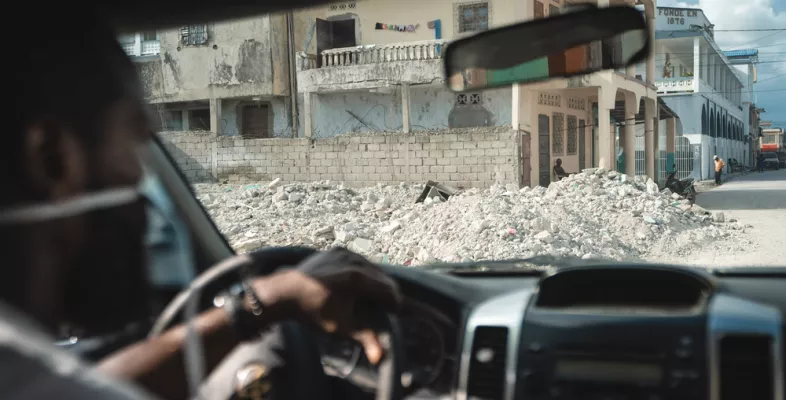After sudden crises, conflicts or natural disasters - like the earthquake in Afghanistan or the current incidents in Israel and the Palestinian Territories - we often receive numerous requests from people offering their practical help and support in the affected region. Often for a very limited period of time and in a specific context (e.g. after a natural disaster in a specific country). We are very happy about the great willingness to get involved! Unfortunately, in most cases we cannot accept these offers of help. Why this is the case and how you can still support us, we would like to show on this page.
We have been working in emergency medical aid for over 50 years and have been able to gain a lot of experience in dealing with emergency events over the course of time. Especially in the case of sudden events, we try to react as quickly as possible ("emergency response"). We work according to tried and tested processes and methods, with standardized tools and treatment protocols.
The coordination, planning and implementation of measures on site (after emergency events often under considerable time pressure and in extreme situations) requires a high degree of resilience as well as experience in emergency aid from our international staff. Therefore, in the case of sudden crises and conflicts or natural disasters, we always rely on staff members who already have many years of experience in coordinating MSF aid projects.
These international staff members are highly qualified professionals and specialists from different professional groups and are responsible for the coordination of the projects on site. However, they only make up a small part of our staff on site.
As an emergency medical aid organization, we often have to react quickly and therefore need a pool of employees who have the greatest possible flexibility in terms of project country/duration and context.
In the case of sudden emergency events, we only send experienced project staff to the affected region. They leave a gap in the previous project. Their position becomes vacant at short notice, which we then have to fill with new international project staff from our pools.
This is why it is so important for people who apply and do not yet have experience in project work to be flexible in terms of project context and country. This enables us to respond in the best possible way to conflicts, crises and natural disasters and to help people.
The minimum time availability is 9 months (with the exception of the specialties gynecology, surgery or anesthesia). This allows us to plan our projects long-term and efficiently. We send only a small part of international staff, they are mostly in charge of the coordination of the project and lead teams on site.
Experience has shown that our employees need a certain amount of time to get used to the conditions, especially when working on a project for the first time. In addition, a longer period of work also contributes to the stability of the project.
Furthermore, the administrative effort and the costs for a deployment (flight, visa, insurances, etc.) are very high in an international context. To ensure that your donation reaches where it is needed, we would like to use the funds as efficiently as possible for the medical care of the people on site.
In many cases, we are already working in the country or region, have ongoing relief projects and personnel on the ground.
We send only a small number of international staff to the relief projects; the majority of our staff (around 90 percent) are recruited locally.
Through local work opportunities, we offer people living in the region one of the often few opportunities to earn a living in addition to medical care, especially during emergency events (such as sudden crises and conflicts or natural disasters).
We have been searching for and recruiting various medical and non-medical professional groups for international project work for decades. The general requirements of the individual professional profiles must be met. After the application process has been positively completed, the person is included in our pool of suitable employees for whom we then search for a suitable project position.
By joining our pool of potential employees, you help us fill gaps in other project positions created by acute emergency events. This enables us to react flexibly and spontaneously to conflicts, crises and natural disasters and to help people.
You can find more information on the topic of cooperation here:
Questions & answers about working within one of our projects
Allthough you might not be able to work in our projects, you can support our work in a variety of ways:
- Your donation enables us to respond flexibly and immediately to disasters and crises. In particular, your permanent donations provide us with the necessary security in planning and implementing our emergency medical aid: Here our German donation form or alternatively information for donations from other countries and/or in other languages.
- Share information and / or our job profiles with your personal network.
- Follow us on social media and share/like our posts.
Video: 100 tons of aid to the crisis area
Following the severe earthquake in Haiti on August 14, 2021, our teams are providing emergency medical aid on the ground. In order to be able to help the people in the crisis area, they need medical material, tents and equipment to set up a water and sanitation supply. In this video, you can find out how our logisticians are bringing 100 tons of relief supplies to Haiti within a short time. The video is in English language with German subtitles.


